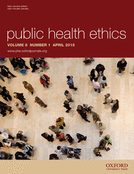-
Views
-
Cite
Cite
Alistair Wardrope, Relational Autonomy and the Ethics of Health Promotion, Public Health Ethics, Volume 8, Issue 1, April 2015, Pages 50–62, https://doi.org/10.1093/phe/phu025
Close - Share Icon Share
Abstract
Recent articles published in this journal have highlighted the shortcomings of individualistic approaches to health promotion, and the potential contributions of relational analyses of autonomy to public health ethics. I argue that the latter helps to elucidate the former, by showing that an inadequate analysis of autonomy leads to misassignment of both forward-looking and backward-looking responsibility for health outcomes. Health promotion programmes predicated on such inadequate analyses are then ineffective, because they assign responsibility to agents whose social environment inhibits their ability to act on such responsibilities; inequitable, because the social barriers to autonomous agency display a socio-economic gradient; and stigmatizing, because they license blaming of individuals for their own poor health without taking into account how reasonable it is to hold these individuals responsible, given the social barriers to autonomy they face. I further sketch how incorporating a relational understanding of autonomy could help to produce health promotion programmes that do not succumb to these difficulties, while avoiding coercive paternalism, exploring potential applications in ecological approaches to health promotion.



